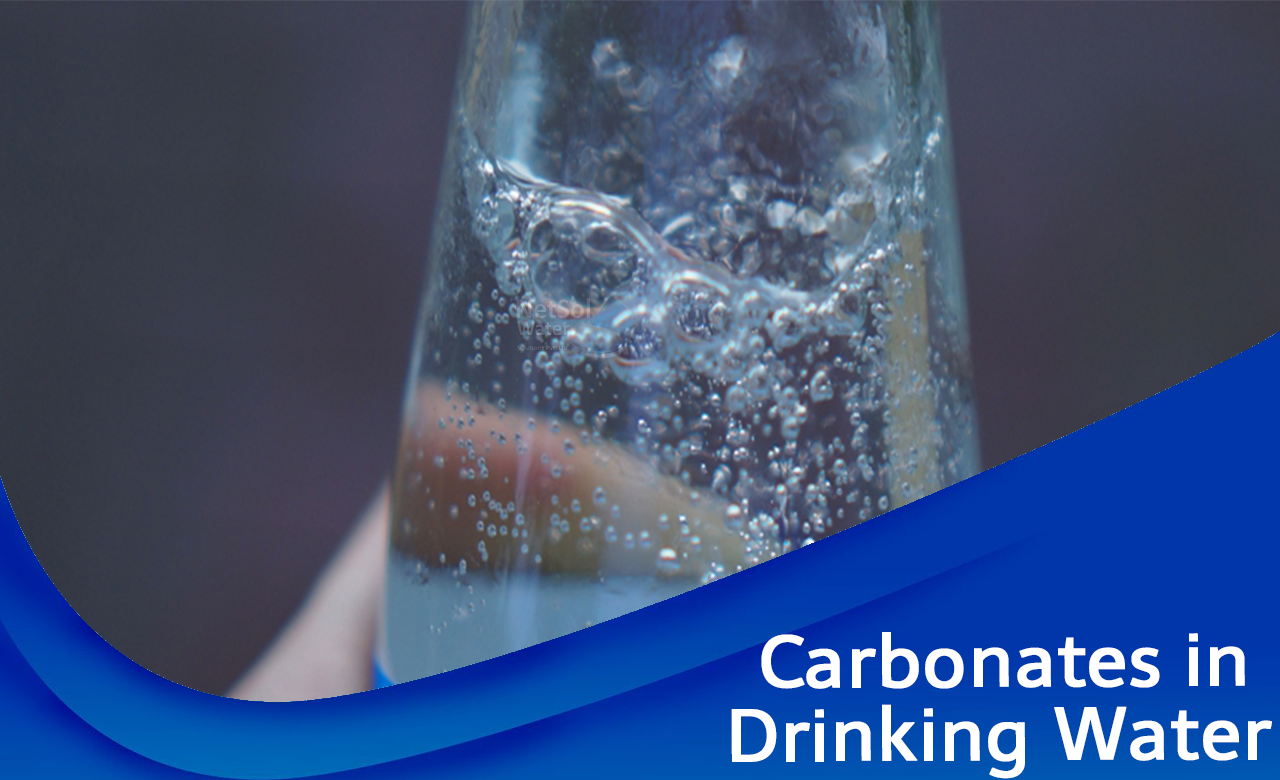Carbonates in drinking water
Carbonates in water come in the form of hardness. Alkalinity and temporary or carbonate hardness are commonly, but not always, interchangeable terms. Alkalinity is actually the concentration of the bicarbonate (HCO–3) ion in the water, hence bicarbonate or hydrogen carbonate is a more scientific name.When acid is dosed into water containing bicarbonate, the ion is transformed to CO2 gas, but the water only becomes somewhat acidic.The pH drop caused by a given acid dose is substantially smaller than the pH drop caused by the same amount of acid dosed into water without bicarbonate. When enough acid has been injected to convert all of the bicarbonate to CO2, more acid is added, resulting in the abrupt pH drop that is predicted from water that contains no bicarbonate. Carbonates in water is present in the form of hardness and it needs to be removed as it can prove to be dangerous to human beings as well as affect the conveyance system.
Sources
Dissolved polyvalent metallic ions from sedimentary rocks, seepage, and runoff from soils are the main natural sources of hardness in water. The two main ions, calcium and magnesium, are found in various sedimentary rocks, the most common of which being limestone and chalk. They are also commonly found in food as necessary mineral elements. Other polyvalent ions, such as aluminium, barium, iron, manganese, strontium, and zinc, contribute a little amount to the total hardness of water, as indicated above.
The impact on human beings
Calcium and magnesium are both vital minerals that benefit human health in a variety of ways. Inadequate consumption of either nutrient might have negative health implications. On a national and international level, daily consumption recommendations for each element have been established. Individuals' requirements for and consumption of these elements differ significantly. A great number of researchers have looked into the potential health benefits of hardness in drinking water. The majority of these investigations were ecological epidemiology studies that found a link between water hardness and cardiovascular mortality. The conclusions that may be taken from these investigations are limited by inherent flaws in the ecological epidemiology study design.A negative correlation (i.e. protective effect) between cardiovascular mortality and drinking-water magnesium has been shown in several case–control and cohort studies. Although this relationship does not prove causation, it is consistent with magnesium's well-known effects on cardiovascular function.
Other negative impacts on health
Hard water exposure has been proposed as a risk factor for eczema exacerbation. Although the environment plays a role in the aetiology of atopic eczema, the exact cause is uncertain. Dust, nylon, shampoo, perspiration, swimming, and wool have all been linked to an increase in eczema flare-ups. Increased soap consumption in hard water, according to one theory, leaves metal or soap salt residues on the skin (or clothes) that are difficult to remove and cause contact irritation.
ADDITIONAL THOUGHTS
Acceptability of taste
To varied degrees, dissolved minerals contribute to the taste of drinking water. Water's acceptability is usually determined by the flavour and familiarity of the consumer. Demineralized water has a bland flavour, thus producers of demineralized bottled or packaged water often add minerals to enhance the flavour. Although certain bottled mineral waters have unusually high mineral concentrations and appeal to some consumers, they are not suitable for most public drinking water systems. Consumer-detectable calcium and magnesium concentrations, as well as other dissolved particles in water, can be controlled through treatment or blending at public facilities.
Corrosion and scaling are two of the most common problems.
Hard water can cause increased soap consumption and scale deposition in the water distribution system, as well as in hot water applications where insoluble metal carbonates coat surfaces and reduce heat exchanger efficiency, depending on interactions with other parameters like pH and alkalinity. Corrosion can be a problem with too hard water. Soft water that hasn't been stabilised has a high proclivity for corroding metal surfaces and pipes, resulting in the presence of heavy metals including cadmium, copper, lead, and zinc in drinking water.
These effects of hard water render it unfit for consumption, but with proper use of treatment processes available we can reduce this hardness and consume water for maximum benefits.
We recommend to use water softening plant. As Netsol Water is best quality water softening plant manufacturer loaded with top and latest technology of the world. for any enaquiry regarding that you can call at: 09650608473 or write us at: enquiry@netsolwater.com.




